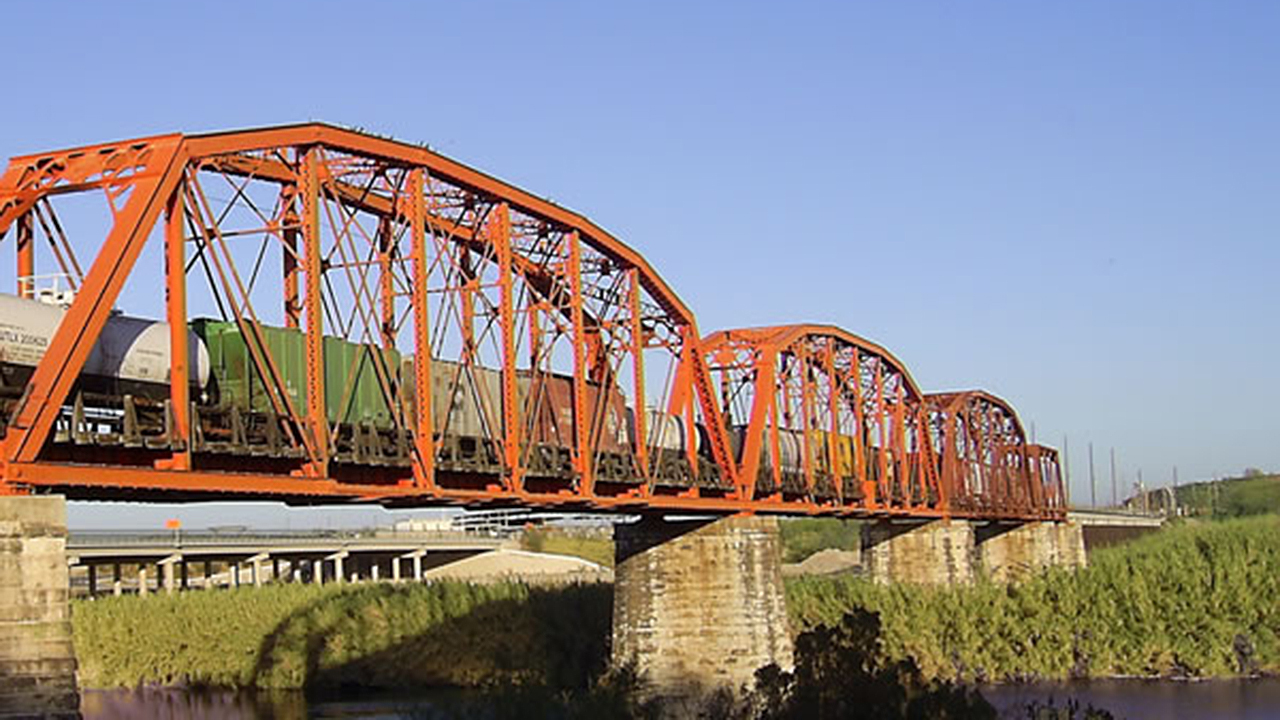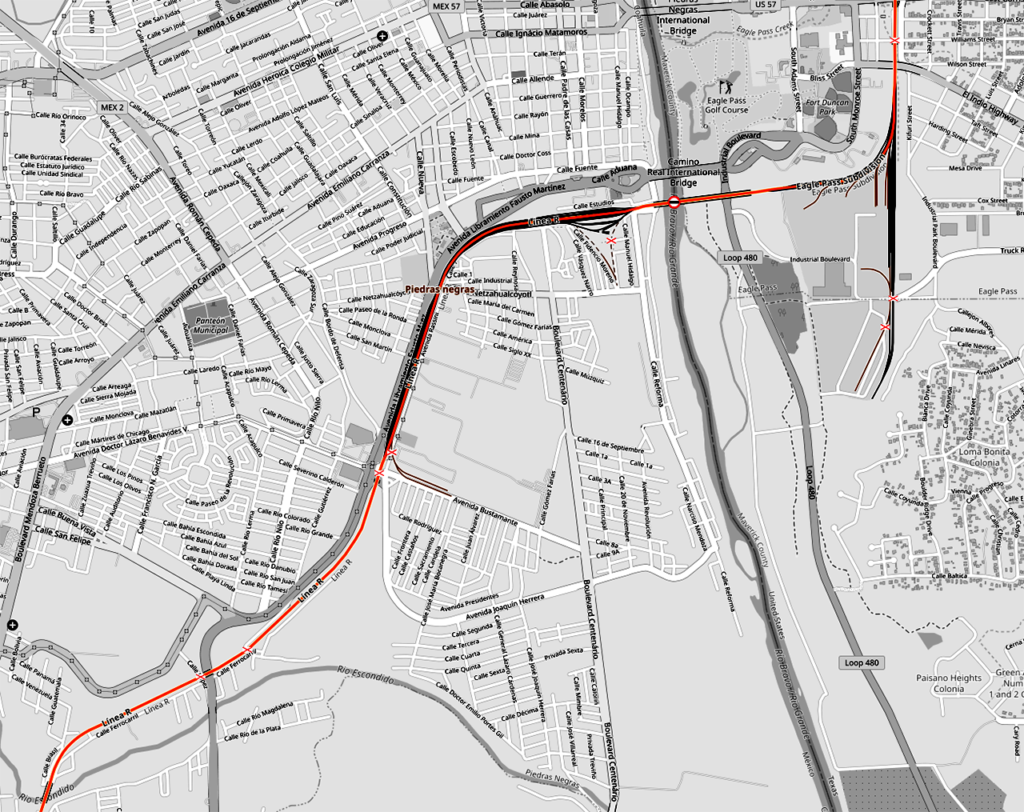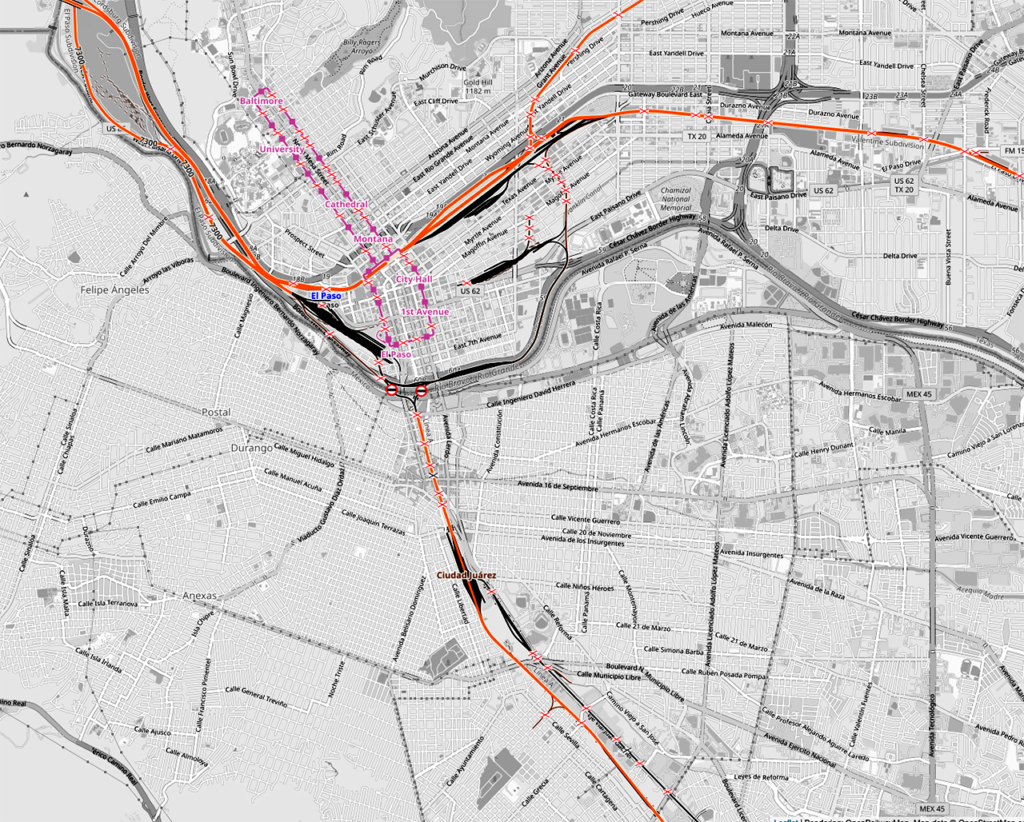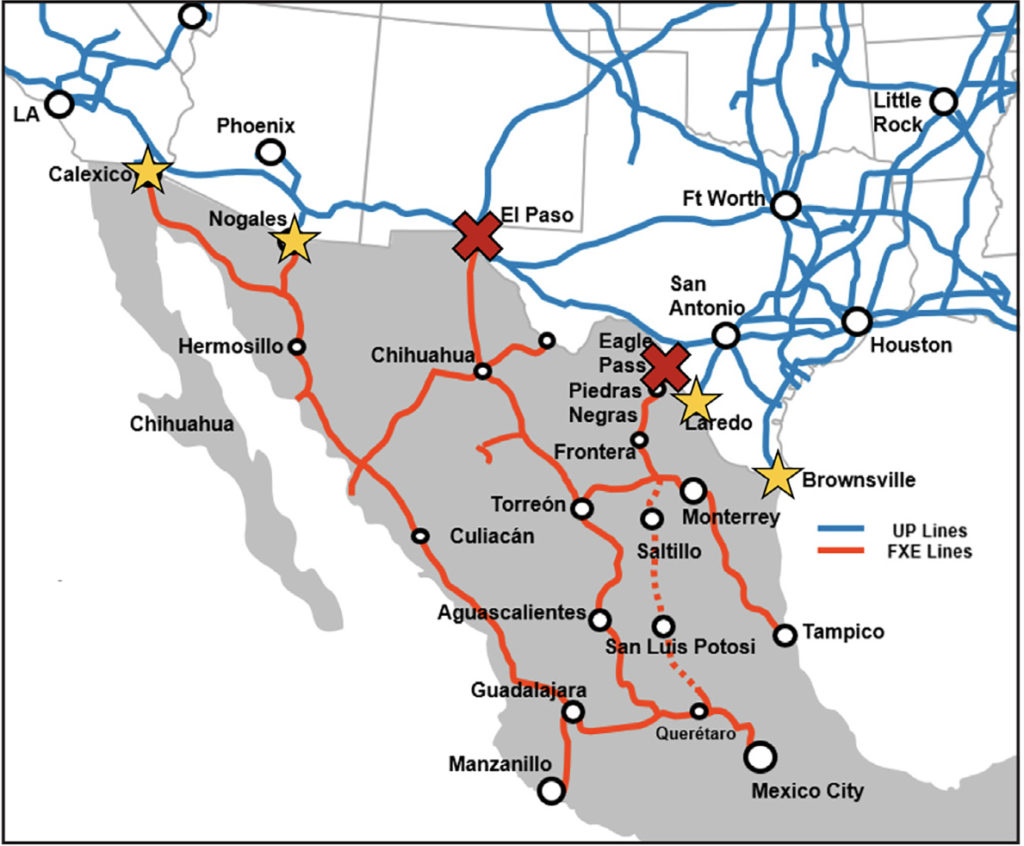
USCPB Shuts Down Eagle Pass, El Paso Rail Crossings—Again (Updated)
Written by Carolina Worrell, Senior Editor
Union Pacific International Railroad Bridge view from Piedras Negras, Mexico. Wikimedia Commons/Manuel Velez
For the second time in four months, the U.S. Customs and Border Protection (CBP) has temporarily suspended operations at three U.S./Mexico international railway crossing bridges—two on Union Pacific and one on BNSF.

One border bridge is at Piedras Negras, Mexico/Eagle Pass, Tex., connecting with UP’s Eagle Pass Subdivision (above). Two are at Ciudad Juarez/El Paso. One connects with UP’s Valentine and Lordsburg Subdivisions, the other with BNSF’s El Paso Subdivision (below).

CPB on Dec. 17 said it was closing the rail crossings “in order to shift staffing due to a surging number of migrants, adding that staff is “being redirected to assist the U.S. Border Patrol with taking migrants into custody and processing while prioritizing border security.” The action took effect at 8:00 a.m. local time Dec. 18.

Union Pacific Impacts
“Union Pacific urges the Eagle Pass and El Paso border crossings be reopened immediately,” the railroad said. “Eagle Pass and El Paso represent roughly 45% of cross-border Union Pacific business and include goods critical to the U.S. economy, and there isn’t enough capacity at our other four gateways to reroute them. With Christmas and the New Year’s holidays just days away, Union Pacific is in close communication with multiple government agencies and our customers, urging that the crossings closed by U.S. Customs and Border Protection be reopened.
“While the company understands this is a complex humanitarian crisis, most migrants are not crossing the border on trains. Union Pacific uses its own employees, police force, and technology including an x-ray system [named VACIS®] that uses gamma-ray imaging, to look for people and contraband. Finding contraband before it makes its way into the U.S. is crucial to the safety and security of our railroad, our employees and the communities we serve. Every day the border is closed, Union Pacific is forced to embargo customers’ goods on more than 60 trains … with an equivalent of goods being held in Mexico. Nearly 10,000 railcars are being held on both sides of the border. Union Pacific is doing everything possible to stage trains and work with customers to prevent congestion at the border. The longer this closure is in effect, the more difficult it will be for cross-border trade to resume.”
UP said that its affected commodities include agricultural products, with grain trains held in six Midwest states; food and beverages (beer and dry food products); automotive (finished vehicles and parts); consumer goods; and industrial commodities (metals and cement).
UP told Railway Age that CPB was redeploying approximately five of its agents normally assigned to the railroad’s border bridges who work in cooperation with UP’s police department and train crews and utilize the VACIS® system because of a staffing shortage at the federal agency.
In September, service had been suspended at the two crossings after Mexican railway operator Ferromex (FXE) temporarily suspended 60 trains on its south-north routes because of an increasing number of migrants climbing aboard railcars, and suffering injuries and fatalities, FXE said.
BNSF Impacts
BNSF said it “is committed to border security as well as protecting the U.S. economy. BNSF was disappointed to learn that the Eagle Pass and El Paso border crossings have been closed, given how important the movement of goods by rail is for businesses, consumers and the economy, particularly with Christmas just days away. We are in regular communication with CBP and other federal agencies urging both crossings be re-opened immediately. We are also working closely with our customers to meet their needs and to prevent further congestion stemming from the crossing closures. Every day of closure increases the impact to the supply chain for critical commodities, including automobiles, industrial products and grain.”
“Currently going to Eagle Pass, we have shipments largely made up of empty autoracks to support Mexico vehicle production shipments, as well as loaded industrial production and construction materials like fiberboard, plastics, refined chemical products and more,” BNSF told Railway Age. “We receive finished autos, appliances and private car shipments of industrial/finished goods including new railcar production. Currently going to El Paso, we have shipments largely made up of loaded grain (corn, wheat, soybeans, meals) as well as demand for empty autoracks and industrial products. We receive back empty grain cars largely used to support U.S. domestic and Mexico demand, as well as other IP goods. We had to begin holding carloads yesterday and staging trains as far away as Minnesota with the recognition that we must work to prevent our customers’ freight from being held at the border. We have a robust and thorough security program to prevent contraband or migrants from entering the U.S. that includes our police force, inspection technologies and our partnership with federal agencies. Through our efforts, we have experienced very few people attempting to cross the border on trains at both ports of entry.”
AAR: “Urgency Cannot Be Overstated”
The Association of American Railroads (AAR) called on CBP to reopen the crossings, “which serve as key arteries for the North American rail network.”
“The urgency of reopening these crossings and restoring rail service between the two nations cannot be overstated,” said AAR President and CEO Ian Jefferies. “There are not separate U.S. and Mexican rail networks; there is only one interconnected North American rail network. Every day the border remains closed unleashes a cascade of delay across operations on both sides of the border, impacting customers and ultimately consumers.”
“The CBP decision most directly and immediately impacts operations for Union Pacific and BNSF, and the customers those companies serve,” AAR noted. “Combined, these two carriers securely operate 24 trains daily at these crossings, moving agricultural products, automotive parts, finished vehicles, chemicals, consumer goods and more to customers spanning the continent. But ultimately, every railroad is affected by this sudden shutdown of operations since all carriers interchange goods across the North American rail network. Even as the industry continues to navigate the fluid situation at the border, railroads are diligently working to limit impacts to customers and the network. When the Eagle Pass and El Paso gateways reopen, the railroads are committed to restoring cross-border movements as quickly and safely as possible.”
“Railroads have worked closely with our partners in both the U.S. and Mexican government to create an effective and efficient screening process,” Jefferies added. “As CBP continues to address the exceptionally challenging humanitarian crisis, railroads urge CBP to also safeguard the nation’s supply chain from further disruption.
CBP’s action was the latest in a series of similar closures along the border “in order to redeploy enforcement resources elsewhere in response to large numbers of migrants,” the agency said. ”After observing a recent resurgence of smuggling organizations moving migrants through Mexico via freight trains, CBP is taking additional actions to surge personnel and address this concerning development, including in partnership with Mexican authorities. CBP is continuing to surge all available resources to safely process migrants in response to increased levels of migrant encounters at the Southwest Border, fueled by smugglers peddling disinformation to prey on vulnerable individuals.”
However, both UP and BNSF told Railway Age that nearly all migrants riding FXE freight trains in Mexico get off and attempt to cross the border on foot. One railroad official familiar with the situatIon said FXE freight trains “are literally covered with migrants, many even using tents for sleeping on top of the railcars. FXE has told the Mexican government it cannot effectively deal with this and has requested military intervention.”
NGFA, NAEGA Weigh In
The National Grain and Feed Association (NGFA) and the North America Export Grain Association (NAEGA) issued a statement:
“The NGFA and NAEGA call for the immediate reopening of the Eagle Pass and El Paso, Texas railroad crossings to allow for the immediate passage of trains between the United States and Mexico. The North American market and grain trade supply chain are deeply intertwined. The closure of these two crossings is impacting the flow of grain and oilseeds for both human and livestock feed to one of the United States most important export markets and trading partners. According to USDA data rail represents 64% of grain and oilseed exports to Mexico, including 15,565,138 metric tons of grains and oilseeds exported via rail in 2021 and 3.45 MTs of grains and oilseeds in the third quarter of 2023.
“NGFA and NAEGA have become aware of critical tightness in feeding supplies for several livestock feeders in Mexico. We have also learned of grain trains in multiple states being held for shipment due to CBP’s embargo. The critical nature of this issue is growing by the hour, particularly for those livestock feeders that may run short of feed.
“We are deeply concerned by the developing situation and request that CBP work with us, the railroads and other federal partners to develop a common sense and expedient solution that reopens this critical mode of agricultural transportation for the U.S. and North American markets.”
Migrant Statistics
Border authorities apprehended nearly 3,000 migrants in Del Rio, Tex., and around 1,300 migrants in El Paso on Dec. 17, “straining federal resources, according to a Homeland Security official,” CNN reported. “Eagle Pass is in the Del Rio Border Patrol Sector. In the past few weeks, CBP has closed ports of entry to vehicular and pedestrian crossings in Eagle Pass, Tex.; Lukeville, Ariz.; and San Ysidro, Calif. After the Lukeville closure, Arizona Governor Katie Hobbs on Dec. 15 ordered National Guard troops to the Mexican border, saying the U.S. federal government’s decision ‘had put public safety and commerce at risk.’ In the first 14 days of December, more than 37,000 migrants were apprehended in the Tucson Border Patrol Sector alone, which includes Lukeville, according to John Modlin, the sector’s Chief Patrol Agent. Border authorities apprehended about 192,000 migrants between ports of entry in November, a 2% increase compared with the 188,000 migrant apprehensions in October, U.S. Border Patrol Chief Jason Owens said.”
Railway Age Editor-in-Chief William C. Vantuono contributed to this story.



